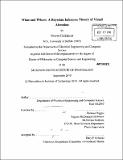What and where : a Bayesian inference theory of visual attention
Author(s)
Chikkerur, Sharat S
DownloadFull printable version (10.73Mb)
Other Contributors
Massachusetts Institute of Technology. Dept. of Electrical Engineering and Computer Science.
Advisor
Tomaso Poggio.
Terms of use
Metadata
Show full item recordAbstract
In the theoretical framework described in this thesis, attention is part of the inference process that solves the visual recognition problem of what is where. The theory proposes a computational role for attention and leads to a model that predicts some of its main properties at the level of psychophysics and physiology. In our approach, the main goal of the visual system is to infer the identity and the position of objects in visual scenes: spatial attention emerges as a strategy to reduce the uncertainty in shape information while feature-based attention reduces the uncertainty in spatial information. Featural and spatial attention represent two distinct modes of a computational process solving the problem of recognizing and localizing objects, especially in difficult recognition tasks such as in cluttered natural scenes. We describe a specific computational model and relate it to the known functional anatomy of attention. We show that several well-known attentional phenomena - including bottom-up pop-out effects, multiplicative modulation of neuronal tuning curves and shift in contrast responses - emerge naturally as predictions of the model. We also show that the bayesian model predicts well human eye fixations (considered as a proxy for shifts of attention) in natural scenes. Finally, we demonstrate that the same model, used to modulate information in an existing feedforward model of the ventral stream, improves its object recognition performance in clutter.
Description
Thesis (Ph. D.)--Massachusetts Institute of Technology, Dept. of Electrical Engineering and Computer Science, 2010. Cataloged from PDF version of thesis. Includes bibliographical references (p. 107-116).
Date issued
2010Department
Massachusetts Institute of Technology. Department of Electrical Engineering and Computer SciencePublisher
Massachusetts Institute of Technology
Keywords
Electrical Engineering and Computer Science.